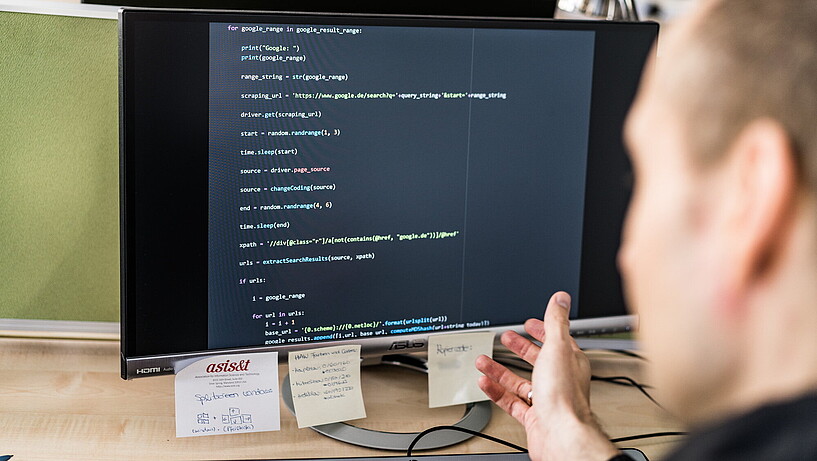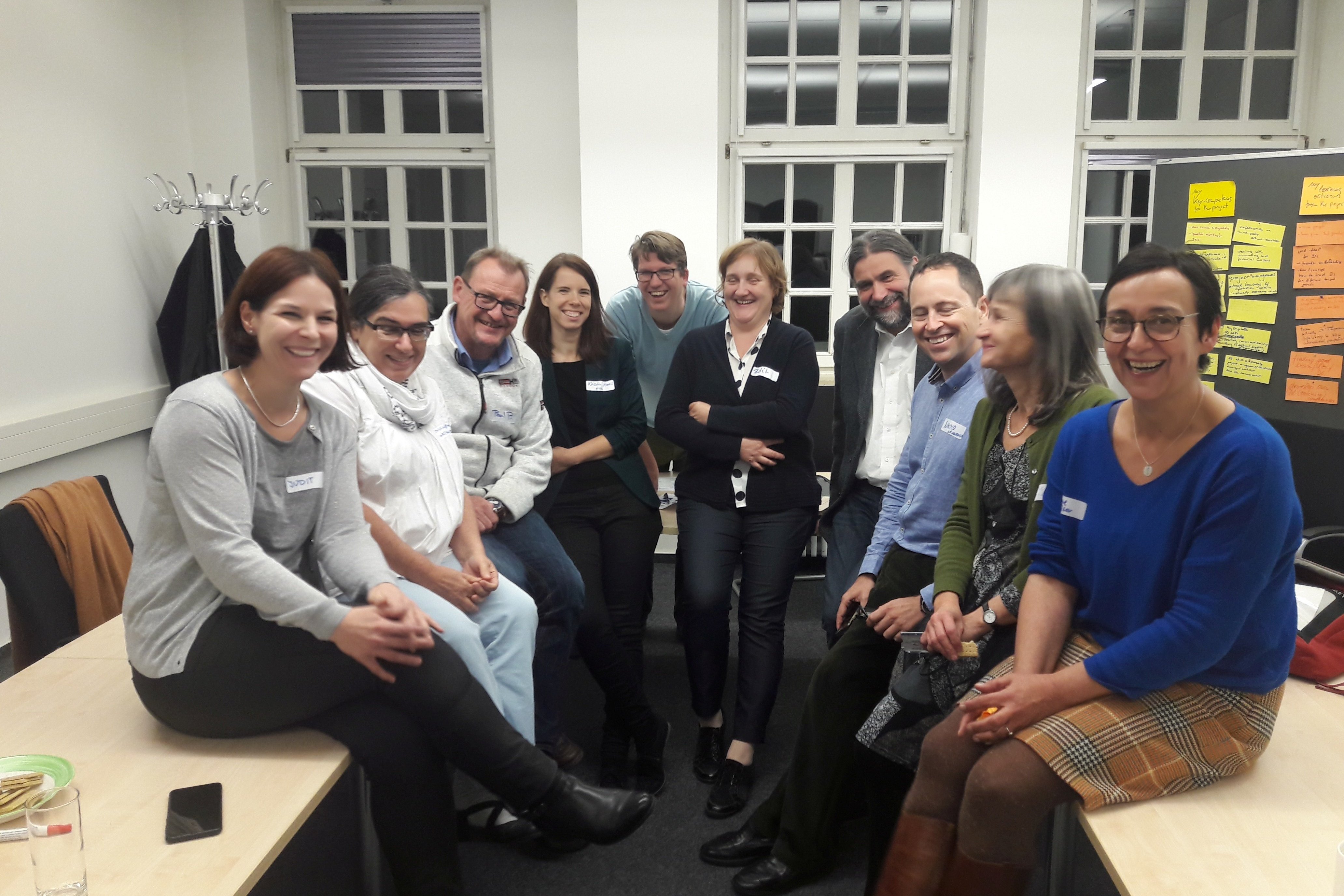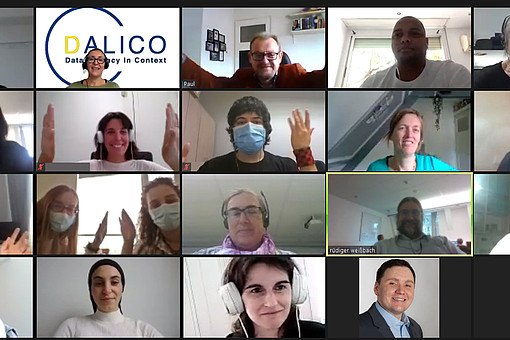Knowledge has always been power. Yet as increasingly larger amounts of data have become available as a result of digitialisation, there has been talk of the 'new gold'. How to handle this gold, however, is something that has to be learned. Students and instructors require an awareness of big data and of the opportunities and risks it brings with it. Additionally, well-trained data experts have attractive career prospects.
How data literate are we really?

Data literacy plays a significant role in an increasing number of degree courses.
We can cover a very large range of topics, from data management and data science to statistics, data ethics and e-learning.
This is where the Data Literacy in Context (DaLiCo) project, which is led by HAW Hamburg, comes in. 'In this international project we want to study the diverse aspects of data literacy and bring the findings to the participating universities,' explains DaLiCo project coordinator Christine Gläser. The professor knows what she is talking about; her areas of expertise in the Department of Information include topics such as information services, electronic publishing, research data management, metadata and data structuring, and information literacy.
HAW Hamburg is represented in the DaLiCo project with a five-person team. Alongside Professor Gläser, the members are Professor Ulrike Spree, Professor Rüdiger Weißbach, Christine Hoffmann and Kristin Ameis, each of whom contributes additional subject expertise and thus ensures an interdisciplinary approach. 'And through our international partners from the Netherlands, Spain and Hungary, the diversity of know-how is further expanded. This enables us to cover a very large range of topics, from data management and data science to statistics, data ethics and e-learning.'
Data literacy is a key skill – in the job market too
But is data literacy really such a complex field? 'We're dealing here with an extremely broad range of skills,' confirms Christine Hoffmann. The central focus is the ability to collect, assess, interpret and use data in a critical manner. 'These competencies have become key skills. This is why one of the project goals is to anchor data literacy in the degree courses – also with a view to students' future careers,' Hoffmann continues. Data experts who can identify correlations in large amounts of data and draw meaningful conclusions from them are increasingly in demand in the job market. For example, the Stepstone jobs portal listed 110 offers for data scientists in Hamburg in December 2020. The potential employers included long-established companies such as Otto, Signal Iduna and KPMG, as well as the online dating site Parship and CTS Eventim, which specialises in the organisation and marketing of events.
This new empiricism can seem seductive when correlations are made that may not even exist in that way – for example, when data is ripped from its original context.
Critical questioning has of course always been an important aspect at universities, but now this skill must be transferred to the digitial sphere – and into a world where data is often only a few clicks away. 'This new empiricism can seem seductive,' says Gläser. 'Depending on the research question or the desired result, the corresponding data visualisations can exhibit correlations that may not even exist in that way – for example, when data is ripped from its original context.' This paves the way for data manipulation, a problem DaLiCo also aims to raise awareness about.
Promoting increased data literacy
The project, which is funded by Erasmus+, is planned to last three years and has a budget of €332,000. It was Professor Olga Burkova, HAW Hamburg's vice president for digitalisation, who significantly drove the project at the university. 'It is therefore an executive initiative,' says Hoffmann. The project started in 2019. 'The first year was about getting to know one another and taking stock of what the needs and interests of the different universities were in order to clarify what knowledge already existed and further develop it,' explains Professor Ulrike Spree.
The coming years will increasingly be devoted to various individual projects. 'We are planning topics such as "train the trainer" in order to target teaching and generate multipliers. The curricular integration of the content developed is a focus, as well as the development of suitable learning spaces and assessment tools – for example, regarding the question "Am I data literate?"' adds Christine Gläser. Although it won't be possible to establish comprehensive solutions within the project time frame, 'we can provide stimulus and initiate prototypical concepts that can be further developed within the four universities.'
Summer schools are the practical building blocks of the project
To ensure that this works, DaLiCo is designed to be as practical as possible. An important building block is the annual summer schools, which are intended to serve as a kind of practical and test environment for the concepts developed. The first summer school took place at the end of September 2020 – digitally because of corona – with doctoral, Master's and Bachelor's students from the partner countries. One of the topics that attracted particular interest was the data ethics aspect. 'This is a point that isn't very present in general but is actually an essential issue which we should have in mind from the very first step of accessing data,' emphasises Kristin Ameis.
The summer school participants tested the critical questioning of data using the 2020 World Happiness Report. The inital findings were as follows: The countries participating in the projects were all relatively happy according to the report. The Netherlands was in sixth place, followed by Germany in 17th place, Spain in 28th place and Hungary in 53rd place – out of a total of 153. But how is this ranking actually generated? The report is produced by the United Nations' Sustainable Development Solutions Network and takes into account factors such as GDP, life expectancy, social programmes for the needy, trust in government and the economy, perceived freedom of choice and willingness to donate. The participants at the DaLiCo summer school developed their own 'data stories' and supplemented them with factors such as equality, criminality and unemployment, as well as geographical and national influences. Depending on the question, the international teams attempted to describe the difficult-to-capture term 'happiness' with objectively measurable data – in order to ultimately arrive at a fair assessment of the data. In any case, this experience stoked everyone's enthusiasm about the 2021 and 2022 summer schools – and about the topic of data literacy.
Text: Yvonne Scheller


